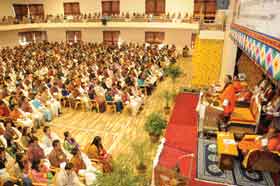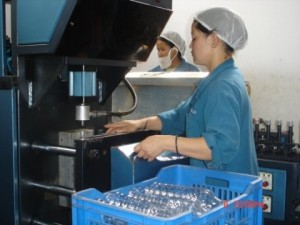Notion and motion of unionism
Disintegration of unionism and collective bargaining is one of those features that make democracy charming and adorable. Unionism not only delivers bargaining calibers to workers but helps germinate affection, friendship and joint work. Collective effort is the final decider to make things happen.
The limitation of unionism bestowed by king-made constitution has been further kept right rein by the private sector of the country. The constitution provides for only one union per company, be it private or public, and this basic norm has been denied by the private companies.

Prime Minister Thinely advises young graduates to seek job at union unfriendly private sector (Photo source: Bhutan Majestic Travels)
Workers who wished to form associations as per the labor law have been told they will have to leave the company at immediate effect if they dare doing so. Bhutan Employment and Labour Act, 2007 has made it mandatory that there should be associations in any company with more than 12 permanent employees. Section 176 of the Act states that workers of an enterprise of 12 or more workers employed under contract of employment as per Chapter V, may form a workers’ association to represent their interests.
Similarly, Section 177 of the Act says that no managerial employee shall be elected to a workers’ association and the association shall not represent the interest of a managerial employee.
The need of a union to fight for the right of workers have been felt, though one has to live at the mercy of owners in the past years. An attempt to form such union in Bhutan Telecom was foiled by the government itself last year.
Thirty-eight regular and 34 muster roll employees of Bhutan Chemical and Carbide Ltd (BCCL) have been sacked at a time and they could do nothing to raise voice against illegal act of the employer. Only option for them was to appeal the Minister of Labor and Human Resources, with no prospects of getting any justice for the government functions in the interest of the business coterie. In fact, the political and business circles are formed of the people coming from same sources, who only appear for different role at different times.
The increasing conflicts between the owners and the workers are taking toll with owners stubborn to keep all associations out of their business territory. It was intentionally been discouraged for any associations of the workers fearing collective bargaining to raise salaries and other benefits. Functionally, this is one example showcasing how had been the workers under lawless Bhutan. The owners thought it otherwise that owner-worker conflict can be solved through dialogue had there been trade unions.
Bhutan Oil Distributor have been denying their employees due leave and promotions and even paying them less than the minimum salaries prescribed legally. And the workers have not been able to do anything about it so far. Accept what is given is way low wage workers adopt to survive now.
The Druk Thuendel Lerig, a construction firm of Tashi group of companies, has recently sacked more than 80 workers for the second time in a short notice, citing increasing losses that the company is incurring. Hundreds of workers at Pasakha industries lost their jobs last year. Many others, even now, cite the reasons of global recession for terminating employees. And speculations of creating anarchy by trade unions have come handy for the recruiters to disallow workers getting united, of late.
The culture of decision making in large companies is whimsical. It is a group of managers who take all the decisions and low level workers have no say in any of the processes or actions even if such decisions go directly against them.
Bhutanese media reports say that many workers from Pasakha industries are never given their salaries on time and were also deprived of incentives and benefits that have been clearly mentioned in their respective service rule books. “If we complain about it, the management takes adverse action against us,” said Sunil, a worker. Another quote the threat from employers saying it is not India or any other country where such things exist.
Bhutan Today quotes a worker Sonam Phuentsho, “Economic growth begins with the sweat of labourers, but they are not protected; yet, managers who walk late into their offices, driving cool, branded cars, and talk over the phone for almost entire day enjoy all the rights, and if this continues it will only ruin the economy.”
The government is mute spectator to all woes of the workers. Employees fail to get response from the ministries where they appeal and tactfully, bureaucrats discourage registration of any unions.
The whole story of happiness, once claimed to be eighth happiest country in the world, is certain to get out presenting the reality, where happiness is played upon by the political and business tycoons while voiceless people at the bottom continue to feel suppressed, undermined.
Had it been permissible, the business tycoons might have already branded these attempts of forming trade unions as ‘terrorist groups’ or those intending to fracture tranquility of their earning. To note, government has little strength to force the big companies to implement labor act since these companies have direct link with palace, now coordinated under Druk Holdings and Investments.
But, we (workers) shall overcome some day……..

